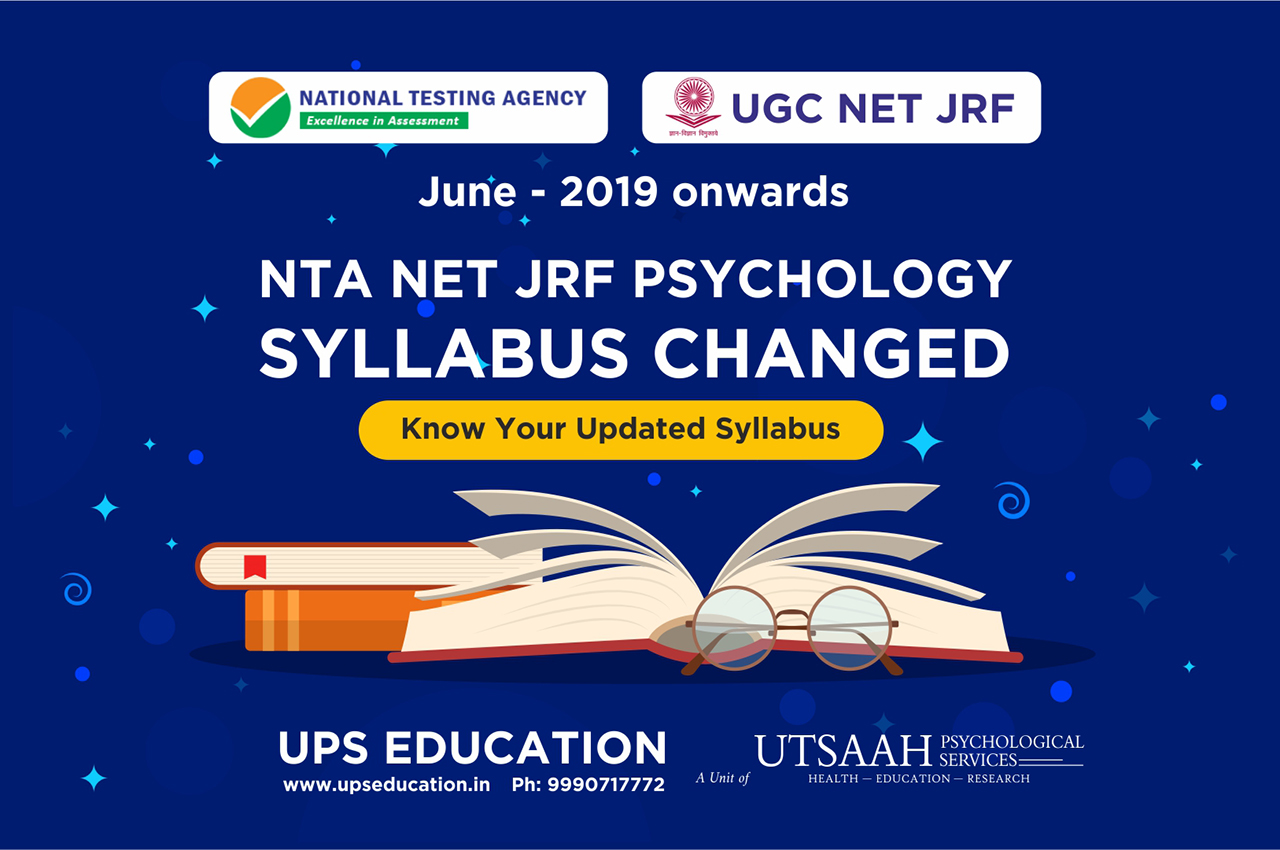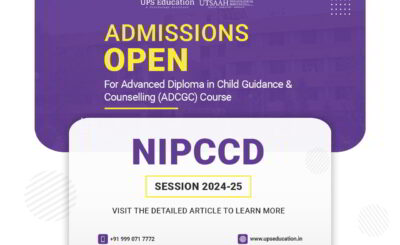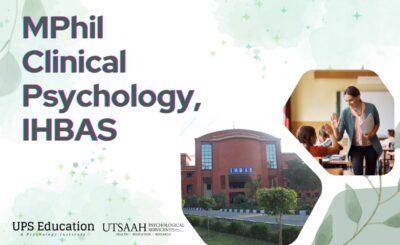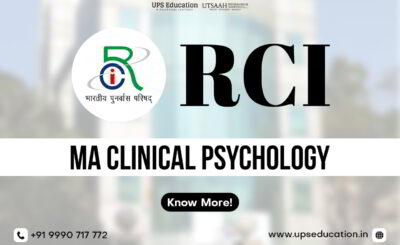![]()
Eventually, after a long period, UGC made the changes in NET/JRF Psychology syllabus and took more than ten years to make this transition.
Before moving on update syllabus of UGC NET/JRF Psychology let us discuss the recent changes made in UGC-NET JRF Examinations;
In November 2017 CBSE changed the pattern of NET/JRF Exams to only two papers instead of three papers.
UGC NET/JRF Exam Pattern
First (Paper-I): 100 Marks (50 out of which 50 questions all are compulsory) [Duration: 1 Hours (09.30 AM to 10.30 AM, IST)]
Second (Paper-II): 200 Marks (100 questions all are compulsory) [Duration: 2 Hours (11.00 AM to 01.00 PM, IST)]
Till July 2018 the NET examination was conducted by CBSE but after the announcement of the HRD Ministry in Aug-2018, the University Grants Commission (UGC) has assigned (NTA) National Testing Agency to conduct the examination. Hence, from Dec 2018 onwards the UGC-NET is being conducted by the National Testing Agency (NTA).
UGC NET Exam was conducted online (Computer Based Test) by NTA in December 2018 for the first time, and the results were declared on 6th January 2019. UGC changed the syllabus for NET Exams after the result of December 2018 NET JRF Exam which is applicable from June 2019 onwards.
UGC NET/JRF Psychology Updated Syllabus
Updated syllabus of NET Psychology is given below. Understand the updated syllabus and make the strategies accordingly for the upcoming NET JRF Examinations. Some topics have been removed and substituted with other topics. Few topics have been merged which were separate for paper -II and paper- III.
You may contact us if you have any query about NET JRF Psychology syllabus, or want any help and guidance regarding your NET Psychology Examinations.
Helpline Number is: 9990717772, For more details visit: www.upseducation.in, Email your query: info.upseducation@gmail.com
UGC NET/JRF PSYCHOLOGY UPDATED SYLLABUS
| S. No. | Topic wise syllabus |
| 1. | Emergence of Psychology: Psychological thought in some major Eastern Systems: Bhagavad Gita, Buddhism, Sufism and Integral Yoga. Academic psychology in India: Pre-independence era; post-independence era; 1970s: The move to addressing social issues; 1980s: Indigenization; 1990s: Paradigmatic concerns, disciplinary identity crisis; 2000s: Emergence of Indian psychology in academia. Issues: The colonial encounter; Postcolonialism and psychology; Lack of distinct disciplinary identity. Western: Greek heritage, medieval period and modern period. Structuralism, Functionalism, Psychoanalytical, Gestalt, Behaviorism, Humanistic, Existential, Transpersonal, Cognitive revolution, Multiculturalism. Four founding paths of academic psychology – Wundt, Freud, James, Dilthey. Issues: Crisis in psychology due to strict adherence to experimental analytical paradigm (logical empiricism). Indic influences on modern psychology. Essential aspects of knowledge paradigms: Ontology, epistemology, and methodology. Paradigms of Western Psychology: Positivism, Post-Positivism, Critical Perspective, Social Constructionism, Existential Phenomenology, and Co-operative Enquiry. Paradigmatic Controversies. Significant Indian paradigms on psychological knowledge: Yoga, Bhagavad Gita, Buddhism, Sufism, and Integral Yoga. Science and spirituality (avidya and vidya). The primacy of self-knowledge in Indian psychology |
| 2. | Research Methodology and Statistics: Research: Meaning, Purpose, and Dimensions. Research problems, Variables and Operational Definitions, Hypothesis, Sampling. Ethics in conducting and reporting research Paradigms of research: Quantitative, Qualitative, Mixed methods approach Methods of research: Observation, Survey [Interview, Questionnaires], Experimental, Quasi-experimental, Field Studies, Cross-Cultural Studies, Phenomenology, Grounded theory, Focus groups, Narratives, Case studies, Ethnography Statistics in Psychology: Measures of Central Tendency and Dispersion. Normal Probability Curve. Parametric [t-test] and Non-parametric tests [Sign Test, Wilcoxon Signed rank test, Mann-Whitney test, Kruskal-Wallis test, Friedman]. Power analysis. Effect size. Correlational Analysis: Correlation [Product Moment, Rank Order], Partial correlation, multiple correlation. Special Correlation Methods: Biserial, Point biserial, tetrachoric, phi coefficient. Regression: Simple linear regression, Multiple regression. Factor analysis: Assumptions, Methods, Rotation and Interpretation. Experimental Designs: ANOVA [One-way, Factorial], Randomized Block Designs, Repeated Measures Design, Latin Square, Cohort studies, Time series, MANOVA, ANCOVA. Single-subject designs. |
| 3. | Psychological testing: Types of tests Test construction: Item writing, item analysis Test standardization: Reliability, validity and Norms Areas of testing: Intelligence, creativity, neuropsychological tests, aptitude, Personality assessment, interest inventories Attitude scales – Semantic differential, Staples, Likert scale. Computer-based psychological testing Applications of psychological testing in various settings: Clinical, Organizational and business, Education, Counseling, Military. Career guidance. |
| 4. | Biological basis of behaviour Sensory systems: General and specific sensations, receptors and processes Neurons: Structure, functions, types, neural impulse, synaptic transmission. Neurotransmitters. The Central and Peripheral Nervous Systems – Structure and functions. Neuroplasticity. Methods of Physiological Psychology: Invasive methods – Anatomical methods, degeneration techniques, lesion techniques, chemical methods, microelectrode studies. Non-invasive methods – EEG, Scanning methods. Muscular and Glandular system: Types and functions Biological basis of Motivation: Hunger, Thirst, Sleep and Sex. Biological basis of emotion: The Limbic system, Hormonal regulation of behaviour. Genetics and behaviour: Chromosomal anomalies; Nature-Nurture controversy [Twin studies and adoption studies] |
| 5. | Attention, Perception, Learning, Memory and Forgetting: Attention: Forms of attention, Models of attention Perception: Approaches to the Study of Perception: Gestalt and physiological approaches Perceptual Organization: Gestalt, Figure and Ground, Law of Organization Perceptual Constancy: Size, Shape, and Color; Illusions Perception of Form, Depth and Movement Role of motivation and learning in perception Signal detection theory: Assumptions and applications Subliminal perception and related factors, information processing approach to perception, culture and perception, perceptual styles, Pattern recognition, Ecological perspective on perception. Learning Process: Fundamental theories: Thorndike, Guthrie, Hull Classical Conditioning: Procedure, phenomena and related issues Instrumental learning: Phenomena, Paradigms and theoretical issues; Reinforcement: Basic variables and schedules; Behaviour modification and its applications Cognitive approaches in learning: Latent learning, observational learning. Verbal Learning and Discrimination Learning Recent trends in learning: Neurophysiology of learning Memory and Forgetting Memory processes: Encoding, Storage, Retrieval Stages of memory: Sensory memory, Short-term memory (Working memory), Long-term Memory (Declarative – Episodic and Semantic; Procedural) Theories of Forgetting: Interference, Retrieval Failure, Decay, Motivated forgetting |
| 6. | Thinking, Intelligence and Creativity Theoretical perspectives on thought processes: Associationism, Gestalt, Information processing, Feature integration model Concept formation: Rules, Types, and Strategies; Role of Concepts in Thinking, Types of Reasoning Language and thought Problem-solving: Type, Strategies, and Obstacles Decision-making: Types and models Metacognition: Metacognitive knowledge and Metacognitive regulation Intelligence: Spearman; Thurstone; Jensen; Cattell; Gardner; Stenberg; Goleman; Das, Kar & Parrila Creativity: Torrance, Getzels & Jackson, Guilford, Wallach & Kogan Relationship between Intelligence and Creativity |
| 7. | Personality, Motivation, emotion, stress and coping Determinants of personality: Biological and socio-cultural Approaches to the study of personality: Psychoanalytical, Neo-Freudian, Social learning, Trait and Type, Cognitive, Humanistic, Existential, and Transpersonal psychology. Other theories: Rotter’s Locus of Control, Seligman’s Explanatory styles, and Kohlberg’s theory of Moral development. Basic motivational concepts: Instincts, Needs, Drives, Arousal, Incentives, Motivational Cycle. Approaches to the study of motivation: Psychoanalytical, Ethological, S-R Cognitive, Humanistic Exploratory behaviour and curiosity Zuckerman’s Sensation-seeking Achievement, Affiliation and Power Motivational Competence Self-regulation Flow Emotions: Physiological correlates Theories of emotions: James-Lange, Canon-Bard, Schachter and Singer, Lazarus, Lindsley. Emotion regulation Conflicts: Sources and types Stress and Coping: Concept, Models, Type A, B, C, D behaviours, Stress management strategies [Biofeedback, Music therapy, Breathing exercises, Progressive Muscular Relaxation, Guided Imagery, Mindfulness, Meditation, Yogasana, Stress Inoculation Training]. |
| 8. | Social Psychology: Nature, scope and history of social psychology Traditional theoretical perspectives: Field theory, Cognitive Dissonance, Sociobiology, Psychodynamic Approaches, Social Cognition. Social perception [Communication, Attributions]; attitude and its change within a cultural context; prosocial behaviour. Group and Social influence [Social Facilitation; Social loafing]; Social influence [Conformity, Peer Pressure, Persuasion, Compliance, Obedience, Social Power, Reactance]. Aggression. Group dynamics, leadership style and effectiveness. Theories of intergroup relations [Minimal Group Experiment and Social Identity Theory, Relative Deprivation Theory, Realistic Conflict Theory, Balance Theories, Equity Theory, Social Exchange Theory] Applied social psychology: Health, Environment and Law; Personal space, crowding, and territoriality. |
| 9. | Human Development and Interventions: Developmental processes: Nature, Principles, Factors in development, Stages of Development. Successful aging. Theories of development: Psychoanalytical, Behavioristic, and Cognitive. Various aspects of development: Sensory-motor, cognitive, language, emotional, social and moral. Psychopathology: Concept, Mental Status Examination, Classification, Causes Psychotherapies: Psychoanalysis, Person-centered, Gestalt, Existential, Acceptance Commitment Therapy, Behavior therapy, REBT, CBT, MBCT, Play therapy, Positive psychotherapy, Transactional Analysis, Dialectic behaviour therapy, Art therapy, Performing Art Therapy, Family therapy. Applications of theories of motivation and learning in School, Factors in educational achievement. Teacher effectiveness Guidance in schools: Needs, organizational setup and techniques Counselling: Process, skills, and techniques |
| 10. | Emerging Areas: Issues of Gender, Poverty, Disability, and Migration: Cultural bias and discrimination. Stigma, Marginalization, and Social Suffering; Child Abuse and Domestic Violence. Peace psychology: Violence, non-violence, conflict resolution at macro level, role of media in conflict resolution. Wellbeing and self-growth: Types of wellbeing [Hedonic and Eudemonic], Character strengths, Resilience and Post-Traumatic Growth. Health: Health-promoting and health-compromising behaviors, Lifestyle and Chronic diseases [Diabetes, Hypertension, Coronary Heart Disease], Psychoneuroimmunology [Cancer, HIV/AIDS] Psychology and technology interface: Digital learning; Digital etiquette: Cyberbullying; Cyber pornography: Consumption, implications; Parental mediation of Digital Usage. |









